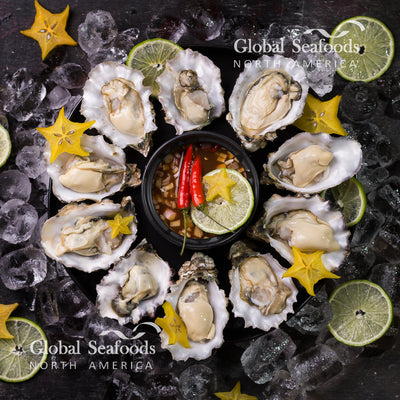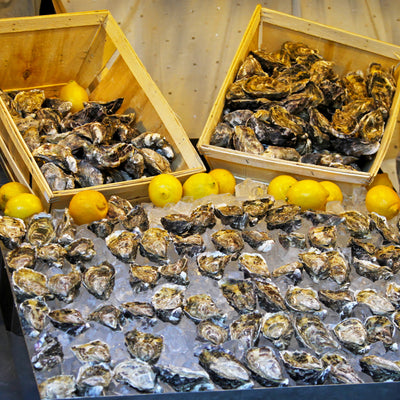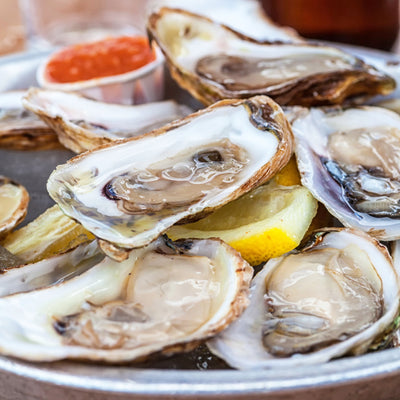The Environmental Impact of Oyster Farming: A Comprehensive Guide

Impact of Oyster Farming
Oyster farming, a practice that has been around for centuries, is becoming increasingly recognized for its environmental benefits. Unlike many forms of aquaculture, oysters require no feed, produce little waste, and actively contribute to cleaner water and healthier marine ecosystems. As demand for oysters grows, understanding the environmental impact of oyster farming becomes essential for ensuring sustainable practices and marine health. This guide delves into the benefits, challenges, and long-term effects of oyster farming, shedding light on why this sustainable seafood practice has become essential for the health of our oceans.Learn more about oyster farming and sustainability on our YouTube Channel.
1. Why Oyster Farming is Important for Marine Ecosystems
Oyster farming goes beyond seafood production; it has a profound positive impact on marine ecosystems. Unlike fish farming, which often requires feed and creates waste, oyster farming is low-impact, working in harmony with nature. Oysters are filter feeders, meaning they draw nutrients from the water, effectively cleaning it in the process. This natural filtration supports marine life, promotes biodiversity, and maintains water quality in bays and estuaries.
Environmental Scientist Perspective: “Oyster farming is a unique example of aquaculture that benefits the ecosystem. Oyster farms provide habitat, improve water quality, and contribute to marine health.” — Dr. Sylvia Earle
Product Highlight: Explore sustainably farmed options such as Cliff Point Petite Oysters for environmentally-friendly seafood choices.
2. How Oyster Farms Contribute to Cleaner Water
Oysters filter water naturally by drawing in particles, including algae and phytoplankton, which can cloud water and disrupt marine ecosystems. A single oyster can filter up to 50 gallons of water daily, significantly improving water clarity and quality. This filtration not only benefits marine life but also helps maintain the balance of nitrogen and phosphorus, reducing harmful algal blooms that often result from excessive nutrients.
Fun Fact: Oyster reefs were once so dense in the Chesapeake Bay that they filtered the entire bay’s water volume every week!
Suggested Product: Try Miyagi Oysters, known for their superior taste and contribution to cleaner waters.
3. The Role of Oysters in Reducing Ocean Pollution
Oysters’ ability to filter out pollutants, including excess nitrogen and heavy metals, makes them essential in combatting ocean pollution. Excess nitrogen often originates from agricultural runoff and contributes to dead zones, where marine life struggles to survive due to low oxygen levels. Oyster farms, by reducing nitrogen levels, play a part in preventing these dead zones and promoting a more balanced, healthy marine ecosystem.
Environmental Benefit: Oysters absorb and store pollutants in their shells and tissues, effectively removing them from the water column and lessening the impact of coastal runoff.
4. Creating Marine Habitats Through Oyster Farming
Oyster farms create vital habitats that support biodiversity. Oyster beds provide a natural refuge for a variety of species, including fish, crabs, and shrimp. This habitat complexity promotes a healthy food web and increases fish populations, which benefits both the ecosystem and local fishing communities. Oyster reefs also serve as natural breakwaters, helping to protect coastlines from erosion and storm surges.
Product Suggestion: Sustainable options like Willapa Bay Oysters not only offer delicious flavors but also support the growth of thriving marine habitats.
5. Carbon Sequestration and Oysters’ Role in Climate Change
Oysters contribute to carbon sequestration, an essential process for mitigating climate change. As oysters grow, they build calcium carbonate shells, effectively storing carbon. This natural carbon sink helps reduce the amount of CO2 in the water and atmosphere, making oyster farming a sustainable choice that benefits both marine life and the global environment.
Sustainable Insight: According to a study by the University of Washington, oyster shells capture and store carbon dioxide, helping to reduce the overall carbon footprint of marine ecosystems.
6. Challenges and Environmental Concerns in Oyster Farming
Despite its benefits, oyster farming presents certain environmental challenges. Overstocking in farms can lead to disease and habitat degradation. Additionally, if not managed properly, invasive species can be introduced into native ecosystems. Responsible oyster farming practices, such as spacing oysters appropriately and monitoring for disease, are essential to mitigate these concerns.
Sustainability Tip: Look for oysters sourced from farms certified for sustainable practices to ensure minimal environmental impact.
Product Recommendation: Consider sustainably sourced options like Tidepoint Oysters, which adhere to environmentally friendly farming standards.
7. Best Practices for Sustainable Oyster Farming
Sustainable oyster farming emphasizes environmental stewardship. Key practices include rotating oyster beds, regularly cleaning farm areas, and monitoring water quality. These practices help maintain oyster health, support cleaner water, and preserve marine habitats.
Best Practices Include:
- Low-Density Farming: Avoids overcrowding and promotes healthier oysters.
- Restorative Farming Techniques: Involves placing oysters in areas where they can naturally filter polluted waters.
- Regular Monitoring: Ensures water quality and oyster health, reducing the risk of disease spread.
8. Economic and Environmental Benefits of Oyster Farms
In addition to environmental gains, oyster farming also offers economic advantages. Oyster farms support local economies by providing jobs and supplying seafood markets. As consumers increasingly seek sustainable seafood, responsibly farmed oysters have become a popular choice, benefiting both the economy and the environment.
Quote from the World Wildlife Fund (WWF): “Oyster farming represents a model of aquaculture that supports both ecological health and economic resilience.”
Explore Options: Discover a range of sustainably sourced oysters like Maine Oysters to support eco-friendly seafood practices.
9. Oyster Farming vs. Wild Harvesting: Environmental Comparison
While wild oyster harvesting has a long history, it can lead to overfishing and habitat degradation. Oyster farming, on the other hand, offers a controlled, sustainable approach that reduces stress on wild oyster populations. Farmed oysters grow quickly, which helps meet demand without depleting wild stocks.
Sustainability Note: Choosing farmed oysters over wild-harvested options supports sustainable seafood practices and promotes long-term ocean health.
10. Supporting Sustainable Oyster Farming Practices
Consumers play an essential role in supporting sustainable oyster farming by choosing oysters from eco-friendly sources. Buying oysters from farms that prioritize environmental health encourages responsible aquaculture practices, helping to maintain clean waters and healthy ecosystems.
Consumer Tip: Look for certifications like “Best Aquaculture Practices” (BAP) or “Marine Stewardship Council” (MSC) when selecting oysters to ensure they’re sustainably sourced.
Product Suggestion: Enjoy Carbajal Oysters, known for their commitment to environmental sustainability and premium quality.
11. FAQs on the Environmental Impact of Oyster Farming
Q1: How do oysters help reduce ocean pollution?
Oysters filter out pollutants like nitrogen and heavy metals, reducing ocean pollution and promoting marine ecosystem health.
Q2: Is oyster farming environmentally sustainable?
Yes, when practiced responsibly, oyster farming is a highly sustainable aquaculture method that benefits water quality, supports biodiversity, and combats pollution.
Q3: How do oysters benefit marine biodiversity?
Oyster beds create habitats for fish, crabs, and other marine life, supporting biodiversity and healthy food webs.
Q4: What role do oysters play in carbon sequestration?
Oysters store carbon in their shells, helping to reduce CO2 levels in the ocean and atmosphere, which supports climate change mitigation.
Q5: Can oyster farming protect coastal areas?
Yes, oyster reefs act as natural breakwaters, reducing wave impact and protecting shorelines from erosion and storm damage.
For a variety of sustainably farmed oysters, visit Global Seafoods to support eco-friendly aquaculture.
Conclusion
Oyster farming offers a remarkable model of sustainable aquaculture, benefiting both the environment and the economy. Through natural filtration, habitat creation, and carbon sequestration, oysters contribute to cleaner waters, healthier marine ecosystems, and reduced coastal erosion. By choosing sustainably sourced oysters, consumers can enjoy delicious seafood while supporting environmental health. With responsible practices, oyster farming stands as a valuable ally in the fight for cleaner oceans and a more sustainable future.
Also in News

How to Make Sea Bream Sushi With Dry-Aged Tuna & Crab Roll — Step-by-Step With Chef Joshua
A complete guide to making Sea Bream sushi at home, including filleting, curing, slicing, and building a Dry-Aged Tuna & Crab sushi roll. Chef Joshua shares professional tips for restaurant-quality results.

Cooked Crab for Game Night: Everything You Need for a Perfect Seafood Party
Take your game night to the next level with a Cooked crab party. Learn the best recipes, cooking tips, and hosting hacks for a memorable seafood feast.

Steam Crab for Date Night: A Romantic Guide to the Perfect Seafood Feast
Make your next date night unforgettable with a romantic Steam crab experience. This guide covers everything you need to know, from ambiance to the best crab varieties.






